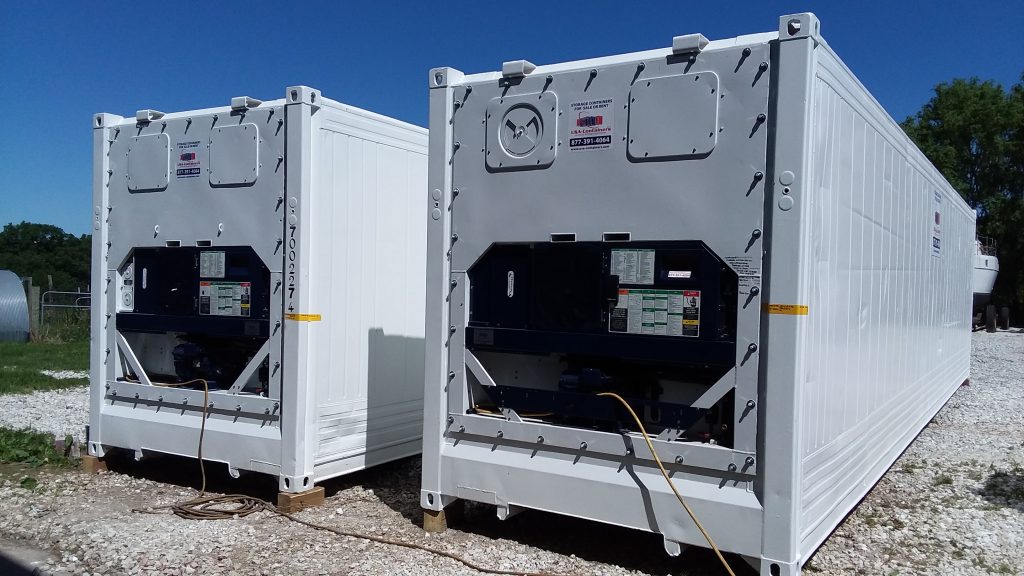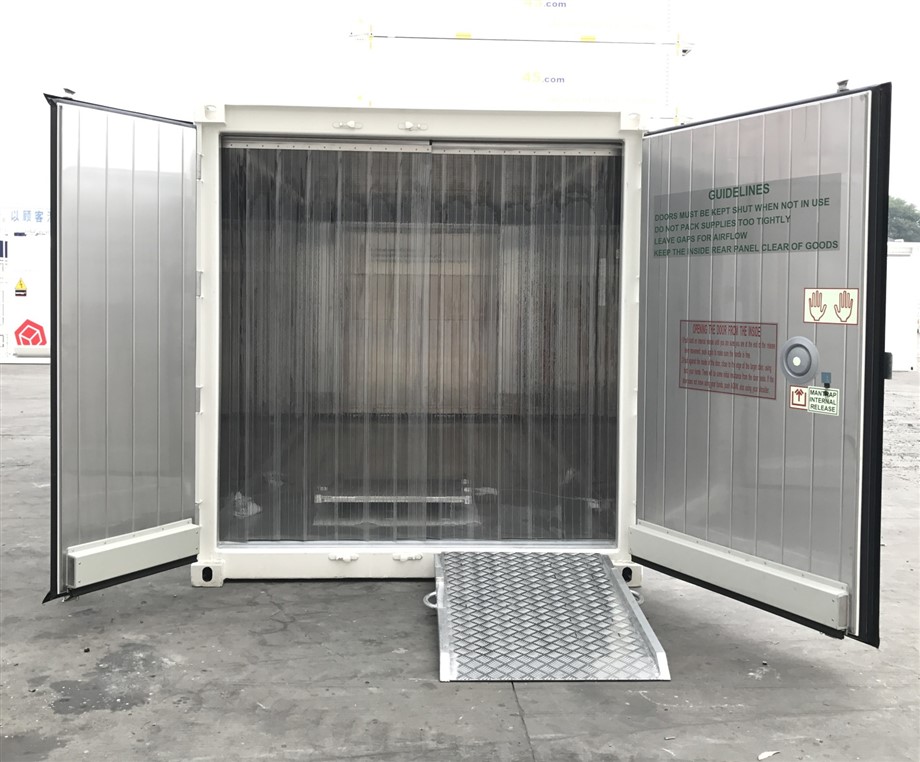Everything About Cold Store Containers: Crucial Insights for Your Storage Requirements
Cold store containers play a crucial role in the preservation of disposable items. They are available in numerous kinds, consisting of cooled and shielded devices, each developed for particular storage space needs. Understanding the benefits and key features of these containers is essential for businesses aiming to enhance their operations. As the demand for reliable storage remedies grows, discovering the various alternatives readily available can result in notified choices that impact both success and sustainability. What factors should one think about when choosing the right container?
Types of Cold Store Containers
Cold store containers been available in various kinds, each created to fulfill particular temperature level control requirements. Among one of the most typical kinds are refrigerated containers, which maintain temperature levels between 0 ° C to 10 ° C, making them appropriate for disposable items like fruits, veggies, and milk items. An additional kind is the deep freezer container, which runs at temperature levels listed below -18 ° C, perfect for lasting storage space of icy things such as meats and fish and shellfish.
Shielded containers provide temperature stability without active air conditioning, making them useful for short-term transport of temperature-sensitive products. Furthermore, there are portable cold store units, which provide versatility in locations and are usually made use of in occasions or seasonal procedures. Blast refrigerators quickly minimize the temperature of hot foods, guaranteeing safety and quality. Each type serves an unique purpose in numerous industries, from food service to pharmaceuticals, stressing the value of choosing the best container for details storage requirements.

Advantages of Using Freezer Solutions

Additionally, freezer options extend the rack life of products, decreasing waste and increasing productivity for services. By effectively handling inventory with appropriate temperature control, business can enhance their supply chains and enhance operational performance.
In addition, chilly storage space centers permit adaptable storage space choices, accommodating various quantity needs and seasonal variations popular (used 40ft refrigerated shipping containers). This versatility helps businesses respond promptly to market adjustments
Finally, employing freezer remedies can assure compliance with health and safety and security policies, guarding both companies and consumers. Overall, the calculated usage of cold storage improves item monitoring while promoting sustainability and financial stability.
Key Features to Search For in Cold Store Containers
When picking freezer containers, numerous key functions advantage careful consideration to safeguard peak performance and integrity. First, temperature control capabilities are vital; containers must keep regular temperatures suitable for certain goods. Insulation top quality additionally plays a considerable role, as superior insulation decreases energy usage and improves temperature level stability.
Next off, convenience of gain access to and loading is crucial; containers ought to supply straightforward layouts for efficient handling and organization. Resilience is an additional essential facet; weather-resistant products guarantee durability and protect components versus environmental variables.
Furthermore, wheelchair functions, such as built-in wheels or lifting factors, facilitate transport, while personalized layouts enable tailored storage options.
Monitoring systems, consisting of temperature alarm systems and remote tracking, offer real-time updates, making particular that conditions remain ideal. By concentrating on these features, customers can choose cold store containers that satisfy their functional demands efficiently.
Selecting the Right Cold Storage Space Container for Your Requirements
Choosing the appropriate cold store container requires a thoughtful analysis of certain requirements and functional demands. Variables such as the type of products being saved, temperature sensitivity, and volume must be focused on. As an example, disposable food things may demand containers with rigid temperature controls, while pharmaceuticals may call for accurate conditions to preserve effectiveness.
Furthermore, prospective customers see should think about the container's dimension and wheelchair. A bigger device might be essential for mass storage, while smaller, portable options might be ideal for on-site or momentary needs. Insulation high quality and power efficiency are additionally critical, as these will certainly impact functional costs and temperature level stability.
Conformity with sector laws and standards is essential, especially in sectors like food and health care. By thoroughly evaluating these elements, users can pick a chilly storage container that properly satisfies their distinct requirements and warranties optimal storage problems.
Ideal Practices for Maintaining Freezer Issues
Keeping optimal cold store conditions is important for preserving the high quality and safety and security of temperature-sensitive products. On a regular basis monitoring temperature and humidity degrees is important; using reputable digital thermometers and hygrometers can offer accurate readings. In addition, appropriate insulation of freezer containers assists reduce temperature level fluctuations and energy loss.
Implementing a first-in, first-out (FIFO) system ensures that older inventory is utilized before newer supply, decreasing waste (used 40ft refrigerated shipping containers). In addition, maintaining an arranged layout within the storage room permits better air movement and decreases the danger of cross-contamination
Routine upkeep checks on devices, such as seals and compressors, are essential to avoid malfunctions. Team training on ideal practices for packing and unloading items helps preserve temperature integrity. Keeping doors shut as much as feasible restrictions heat exchange, guaranteeing that the cold storage space atmosphere remains effective and stable in preserving important products.
Cost Factors To Consider for Cold Store Solutions
When examining cold store services, it is crucial to consider the preliminary investment prices together with ongoing operational expenditures. A comprehensive break down of these expenses can expose significant long-term savings possibility for organizations. Recognizing these monetary elements helps stakeholders make notified decisions regarding their freezer demands.

Initial Financial Investment Expenses
The monetary landscape of freezer containers offers numerous initial investment costs that organizations should consider. These costs usually include the purchase or rental price of the containers, which can vary based on kind, insulation, and size top quality. In addition, expenses connected to retrofitting existing structures to fit cold store should be factored in, particularly if specialized tools is needed. Installment expenses, consisting of electric job and refrigeration systems, also add to the total preliminary investment. Organizations need to not neglect transportation prices for delivering containers to their desired location. Lastly, potential modification options, such click resources as shelving or temperature level surveillance systems, this can even more affect the preliminary financial expense. Careful budgeting for these elements is vital for successful cool storage execution.
Operational Expenses Malfunction
Operational expenditures for cold storage space services incorporate numerous vital cost factors to consider that companies must browse. Key factors consist of energy prices, which can be considerable because of the need to keep low temperatures. Upkeep expenses are likewise significant, as routine servicing is necessary to assure devices runs efficiently and continues to be compliant with health and security criteria. In addition, labor expenses may emerge from the demand for specialized team to keep track of the storage space and handle atmosphere. Insurance expenditures are another factor to consider, as firms need to protect their financial investments against possible losses. Any potential governing compliance costs have to be factored in, as services may need to spend in systems that stick to food safety and ecological policies. Understanding these expenditures is vital for reliable budgeting.
Long-Term Cost Savings Possible
Investing in chilly storage services offers substantial long-term financial savings capacity, changing preliminary expenditures into economic efficiency over time. By decreasing spoilage and waste, organizations can improve their profit margins considerably. Advanced insulation and energy-efficient systems minimize utility prices, which gather over the lifespan of the devices. In addition, cold store containers often need much less constant upkeep contrasted to traditional refrigeration approaches, resulting in reduced fixing expenditures. The capacity to store items for extended durations without endangering quality permits companies to maximize market variations, maximizing income. Furthermore, the scalability of freezer options makes it possible for business to adjust to altering demands without incurring too much costs. On the whole, these variables add to a compelling instance for cold store as a cost-efficient investment approach.
Frequently Asked Inquiries
The Length Of Time Can Food Be Saved in Cold Storage Containers?
The period food can be stored in cold store containers differs by type. Usually, perishable things last from days to weeks, while icy foods can stay risk-free for months, relying on proper temperature and storage problems.
Are Freezer Containers Energy-Efficient?
The energy efficiency of cold storage containers differs based upon design and insulation high quality. Modern devices typically utilize sophisticated technology to reduce energy usage, inevitably adding to lowered operational expenses and environmental influence in lasting use.
Can Freezer Containers Be Customized for Specific Requirements?
Cold store containers can undoubtedly be customized to fulfill particular demands. Alterations might include temperature level controls, size modifications, and extra features, enabling individuals to customize remedies successfully for numerous storage demands and functional preferences.
What Are the Usual Dimensions of Freezer Containers?
Cold storage space containers commonly can be found in conventional dimensions such as 10, 20, and 40 feet. These measurements suit numerous storage space needs, making sure versatility for organizations requiring temperature-controlled settings for delicate materials or perishable items.
Do Freezer Containers Require Unique Authorizations for Use?
Cold store containers typically call for unique permits for use, depending upon regional guidelines and meant applications. Authorities may mandate licenses to guarantee safety and security standards, environmental conformity, and proper functional methods are kept throughout their application.
Cold storage containers come in various kinds, each made to meet specific temperature level control requirements. Furthermore, chilly storage facilities allow for versatile storage options, accommodating numerous volume needs and seasonal variations in demand. Selecting the right cold storage container calls for a thoughtful analysis of certain needs and operational needs. The monetary landscape of cold storage space containers presents numerous initial investment prices that services need to take into consideration. Cold storage containers can without a doubt be personalized to satisfy particular needs.